AWM41 978 - [Nurses Narratives] Sister G A Grewer
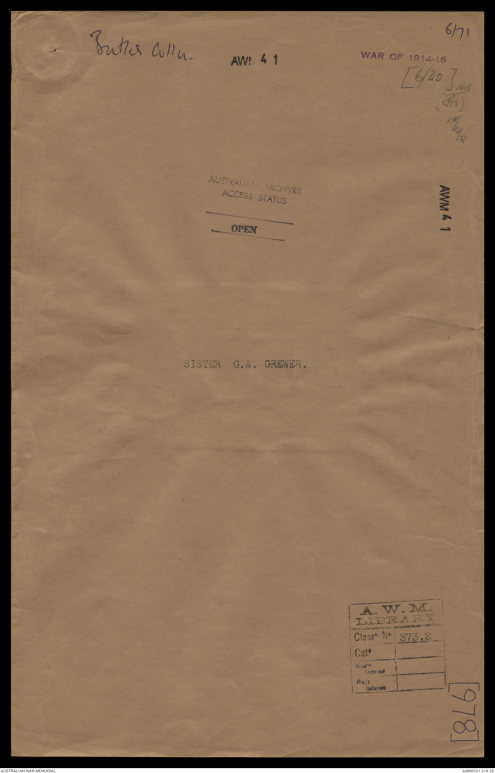
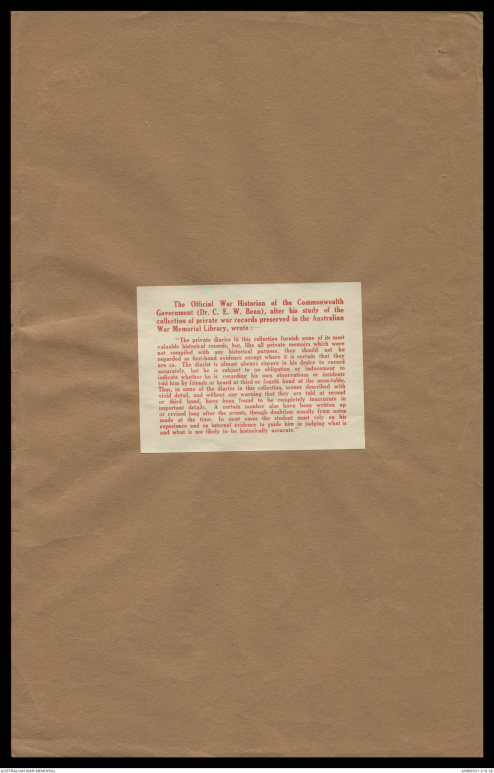
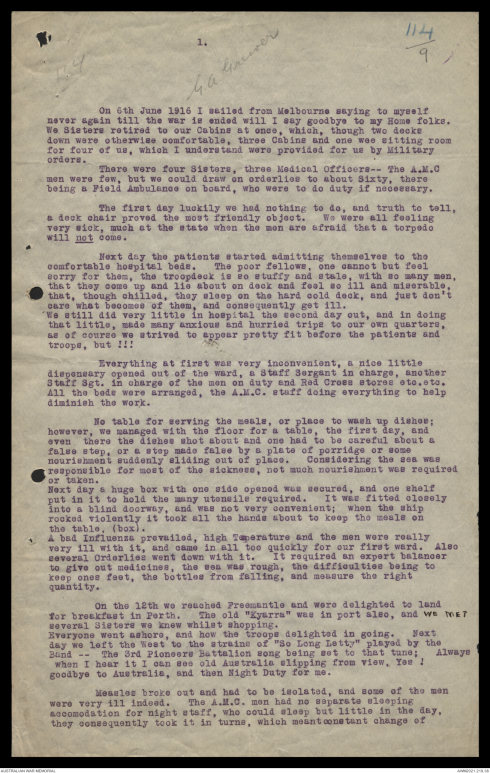
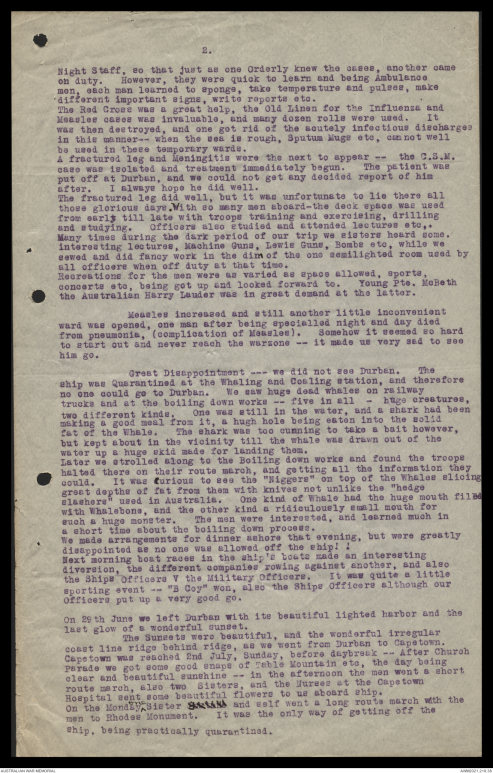
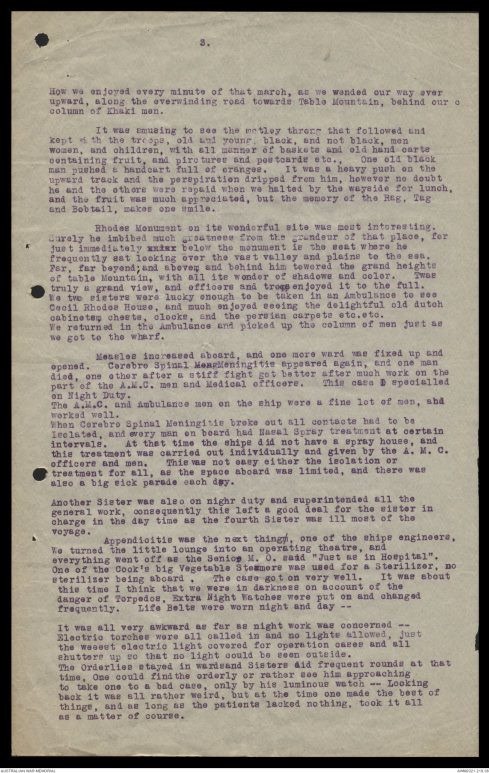
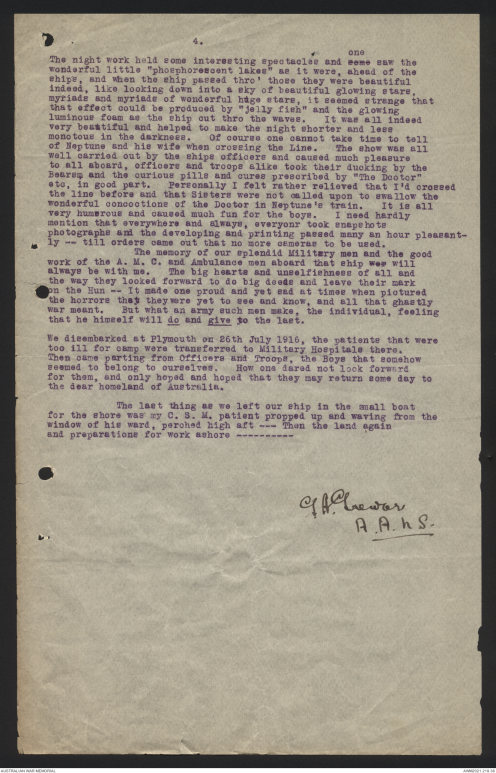
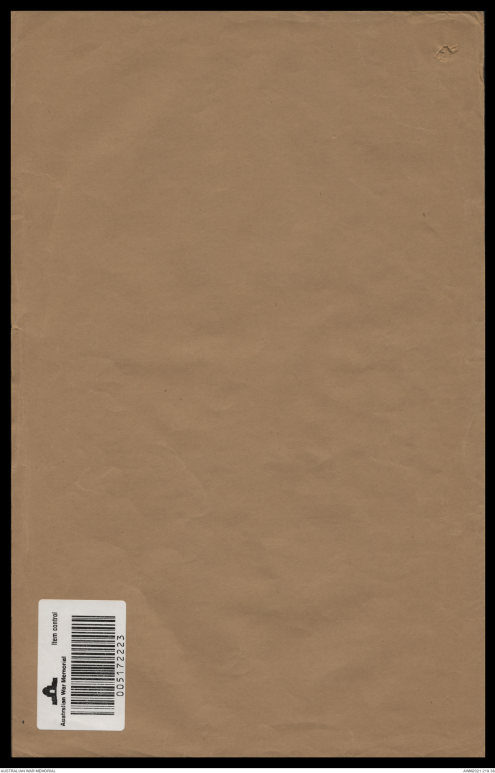
Sister G.A. Grewer
The Official War Historian of the Commonwealth
Government (Dr. C. E. W. Bean), after his study of the
collections of private war records preserved in the Australian War Memorial Library, wrote:
"The private diaries in this collection furnish some of the most
valuable historical records but, like all private memoirs which were
not compiled with any historical purpose, they should not be
regarded on firsthand evidence except where it is certain that they
are in. The diariest is almost always sincere in his desire to record accurately, but he is subject to an obligation or inducement to
indicate whether he is recording his own observations or incidents
told to him by friends or heard at third or fourth hand at the [[?]]
That, in some of the diaries in this collection, scenes were described with
vivid detail, and without any warning that they are told at second
or third hand, have been found to be completely inaccurate in
important details. A certain [?] also have been written up
or revised long after the events, though doubtless [?] [?] [?]
made at the time. In most cases this student must rely on his
experiences and [?] [?] evidence to guide him in judging what is
read what is not likely to be historically accurate.
1.
On 6th June 1916 I sailed from Melbourne saying to myself never again till the war is ended will I say goodbye to my Home folks.
We Sisters retired to our Cabins at once, which, though two decks
down were otherwise comfortable, three Cabins and one wee sitting room
for four of us, which I understand were provided for us by Military
orders.
There were four Sisters, three Medical Officers-- The A.M.C
men were few, but we could draw on orderlies to about Sixty, there
being a Field Ambulance on board, who were to do duty if necessary.
The first day luckily we had nothing to do, and truth to tell,
a deck chair proved the most friendly object. We were all feeling
very sick, much at the state when the men are afraid that a torpedo
will not come.
Next day the patients started admitting themselves to the
comfortable hospital beds. The poor fellows, one cannot but feel
sorry for them, the troopdeck is so stuffy and stale, with so many men,
that they come up and lie about on deck and feel so ill and miserable,
that, though chilled, they sleep on the hard cold deck, and just don't
care what becomes of them, and consequently get ill.
We still did very little in hospital the second day out, and in doing
that little, made many anxious and hurried trips to our own quarters,
as of course we strived to appear pretty fit before the patients and
troops, but !!!
Everything at first was very inconvenient, a nice little
dispensary opened out of the ward, a Staff Sergant in charge, another
Staff Sgt. in charge of the men on duty and Red Cross stores etc.etc.
All the beds were arranged, the A.M.C. staff doing everything to help
diminish the work.
No table for serving the meals, or place to wash up dishes;
however, we managed with the floor for a table, the first day, and
even there the dishes shot about and one had to be careful about a
false step, or a step made false by a plate of porridge or some
nourishment suddenly sliding out of place. Considering the sea was
responsible for most of the sickness, not much nourishment was required
or taken.
Next day a huge box with one side opened was secured, and one shelf
put in it to hold the many utensils required. If was fitted closely
into a blind doorway, and was not very convenient; when the ship
rocked violently it took all the hands about to keep the meals on
the table. (box).
A bad Influenza prevailed, high Teperature and the men were really
very ill with it, and came in all too quickly for our first ward. Also
several Orderlies went down with it. It required an expert balancer
to give out medicines, the sea was rough, the difficulties being to
keep ones feet, the bottles from falling, and measure the right
quantity.
On the 12th we reached Freemantle and were delighted to land
for breakfast in Perth. The old "Kyarra" was in port also, and we met
several Sisters we knew whilst shopping.
Everyone went ashore, and how the troops delighted in going. Next
day we left the West to the strains of "So Long Letty" played by the
Band -- The 3rd Pioneers Battalion song being set to that tune; Always
when I hear it I can see old Australia slipping from view. Yes !
goodbye to Australia, and then Night Duty for me.
Measles broke out and had to be isolated, and some of the men
were very ill indeed. The A.M.C. men had no separate sleeping
accommodation for night staff, who could sleep but little in the day,
they consequently took it in turns, which meant constant change of
2.
Night Staff, so that just as one Orderly knew the cases, another came
on duty. However, they were quick to learn and being Ambulance
men, each man learned to sponge, take temperature and pulses, make
different important signs, write reports etc.
The Red Cross was a great help, the Old Linen for the Influenza and
Measles cases were invaluable, and man dozen rolls were used. It
was then destroyed, and one got rid of the acutely infectious discharges
in this manner-- when the sea is rough, Sputum Mugs etc, cannot well
be used in these temporary wards.
A fractured leg and Meningitis were the next to appear -- the C.S.M.
case was isolated and treatment immediately begun. The patient was
put off at Durban, and we could not get any decided report of him
after. I always hope he did well.
The fractured leg did well, but it was unfortunate to lie there all
those glorious days. With so many man aboard-the deck space was used
from early till late with troops training and exercising, drilling
and studying. Officers also studied and attended lectures etc,.
Many times during the dark period of our trip we sisters hear some,
interesting lectures, Machine Guns, Lewis Guns, Bombs etc, while we
sewed and did fancy work in the dim of the one semilighted room used by
all officers when off duty at that time.
Recreations for the men were as varied as space allowed, sports,
concerts etc, being got up and looked forward to. Young Pte McBeth
the Australian Harry Lauder was in great demand at the latter.
Measles increased and still another little inconvenient
ward was opened, one man after being specialled night and day died
from pneumonia, (complication of Measles). Somehow it seemed so hard
to start out and never reach the warzone -- it made us very sad to see
him go.
Great Disappointment --- we did not se Durban. The
ship was Quarantined at the Whaling and Coaling station, and therefore
no one could go to Durban. We saw huge dead whales on railway
trucks and at the boiling down works -- five in all - huge creatures,
two different kinds. One was still in the water, and a shark had been
making a good meal from it, a hugh hole being eaten into the solid
fat of the Whale. The shark was too cunning to take a bait however,
but kept about in the vicinity till the whale was drawn out of the
water up a huge skid made for landing them.
Later we strolled along to the Boiling down works and found the troops
halted there on their route march, and getting all the information they
could. If was curious to see the "Niggers" on top of the Whales slicing
great depths of fat from them with knives not unlike the "hedge
slashers" used in Australia. One kind of Whale had the huge mouth filled
with Whalebone, and the other kind a ridiculously small mouth for
such a huge monster. The men were interested, and learned much in
a short time about the boiling down process.
We made arrangements for dinner ashore that evening, but were greatly
disappointed as no one was allowed off the ship! !
Next morning boat races in the ship's boats made an interesting
diversion, the different companies rowing against another, and also
the Ships Officers V the Military Officers. It was quite a little
sporting event -- "B Coy" won, also the Ships Officers although our
Officers put up a very good go.
On 29th June we left Durban with its beautiful lighted harbor and the
last glow of a wonderful sunset.
The Sunsets were beautiful, and the wonderful irregular
coast line ridge behind ridge, as we went from Durban to Capetown.
Capetown was reached 2nd July, Sunday, before daybreak -- After Church
Parade we got some good snaps of Table Mountain etc, the day being
clear and beautiful sunshine -- in the afternoon the men went a short
route march, also two Sisters, and the Nurses at the Capetown
Hospital sent some beautiful flowers to us aboard ship.
On the Monday the Sister and self went a long route march with the
men to Rhodes Monument. It was the only way of getting off the
ship, being practically quarantined.
3.
How we enjoyed every minute of that march, as we wended our way ever
upward, along the everwinding road towards Table Mountain, behind our c
column of Khaki me.
It was amusing to see the motley throng that followed and
kept with the troops, old and young, black, and not black, men
women, and children, with all manner of baskers and old hand carts
containing fruit, and pictures and postcards etc., One old black
man pushed a handcart full of oranges. It was a heavy push on the
upward track and the perspiration dripped from him, however no doubt
he and the others were repaid when we halted by the wayside for lunch,
and the fruits was much appreciated, but the memory of the Rag, Tag
and Bobtail, makes one smile.
Rhodes Monument on its wonderful site was most interesting.
Surely he imbibed such greatness from the grandeur of that place, for
just immediately xxxxx below the monument is the seat where he
frequently sat looking over the vast valley and plains to the sea.
Far, far beyond; and above and behind him towered the grant heights
of table Mountain, with all its wonder of shadows and color. Twas
truly a grand view, and officers and troops enjoyed it to the full.
We two sisters were lucky enough to be taken in an Ambulance to see
Cecil Rhodes House, and much enjoyed seeing the delightful old dutch
cabinets, chests, clocks, and the persian carpets etc.etc.
We returned in the Ambulance and picked up the column of men just as
we go to the wharf.
Measles increased aboard and one more ward was fixed up and
opened. Cerabre Spinal MengMeningitis appeared agaain, and one man
died, one other after a stiff fight got better after much work on the
part of the A.M.C. men and Medical officers. This care [?] specialled
on Night Duty.
The A.M.C. and Ambulance men on the ship were a fine lot of men, and
worked well.
When Cerabre Spinal Meningitis broke out all contacts had to be
Isolated, and every man on board had Nasal Spray treatment at certain
intervals. At that time the ships did not have a spray house, and
this treatment was carried out individually and given by the A. M. C.
officers and men. This was not easy either the isolation or
treatment for all, as the space aboard was limited, and there was
also a big sick parade each day.
Another Sister was also on night duty and superintended all the
general work, consequently this left a good deal for the sister in
charge in the day time as the fourth Sister was ill most of the
voyage.
Appendicitis was the next thingm, one of the ships engineers,
We turned the little lounge into an operating theatre, and
everything went off as the Senior M. O. said "Just as in Hospital".
One of the Cook's big Vegetable Steamers was used for a Sterilizer, no
steriliser being aboard. The case got on very well. It was about
this time I think that we were in darkness on account of the
danger of Torpedos, Extra Night Watches were put on and changed
frequently. Life Belts were worn night and day --
It was all very awkward as far as night work was concerned --
Electric torches were all called in and no lights allowed, just
the weeest electric light covered for operation cases and all
shutters up so that no light could be seen outside.
The Orderlies stayed in wardsand Sisters did frequent rounds at what
time, One could find the orderly or rather see him approaching
to take one to a bad case, only by his luminous watch -- Looking
back it was all rather weird, but at the time one made the best of
things, and as long as the patients lacked nothing, took it all
as a matter of course.
4.
The night work held some interesting spectacles and some one saw the
wonderful little "phosphorescent lakes" as it were, ahead of the
ships, and when the ship passed thro' those they were beautiful
indeed, like looking down into a sky of beautiful glowing stars,
myriads and myriads of wonderful huge stars, it seemed strange that
that effect could be produced by "jelly fish" and the glowing
luminous foam as the ship cut thro the waves. It was all indeed
very beautiful and helped to make the night shorter and less
monotous in the darkness. Of course one cannot take time to tell
of Neptune and his wife when crossing the Line. The show was all
well carried out by the ships officers and caused much pleasure
to all aboard, officers and troops alike took their ducking by the
Bearsm and the curious pills and cures prescribed by "The Doctor"
etc, in good part. Personally I felt rather relieved that I'd crossed
the line before and that Sisters were not called upon to swallow the
wonderful concoctions of the Doctor in Neptune's train. It is all
very humerous and caused much fun for the boys. I need hardly
mention that everywhere and always, everyonr took snapshots
photographs and the developing and printing passed man an hour pleasantly --
till orders came out that no more cameras to be used.
The memory of our splendid Military men and the food
work of the A. M. C. and Ambulance men aboard that ship was will
always be with me. The big hearts and unselfishness of all and
they way they looked forward to do big deeds and leave their mark
on the Hun -- It made one proud and yet sad at times when pictured
the horros that they were yet to see and know, and all that ghastly
war meant. But what an army such men make, the individual, feeling
that he himself will do and give to the last.
We disembarked at Plymouth on 26th July 1916, the patients that were
too ill for camp were transferred to Military Hospitals there.
Then came parting from Officers and Troops, the Boys that somehow
seemed to belong to ourselves. How one dared not look forward
for them, and only hoped and hoped that they may return some day to
the dear homeland of Australia.
The last thing as we left our ship in the small boat
for the shore was my C. S. M. patient propped up and waving from the
window of his ward, perched high aft --- Then the land again
and preparations for work ashore ------------
G.A Grewer
A.A.h.S
Blank Page with Australian War Memorial Bar Code
 Sam scott
Sam scottThis transcription item is now locked to you for editing. To release the lock either Save your changes or Cancel.
This lock will be automatically released after 60 minutes of inactivity.